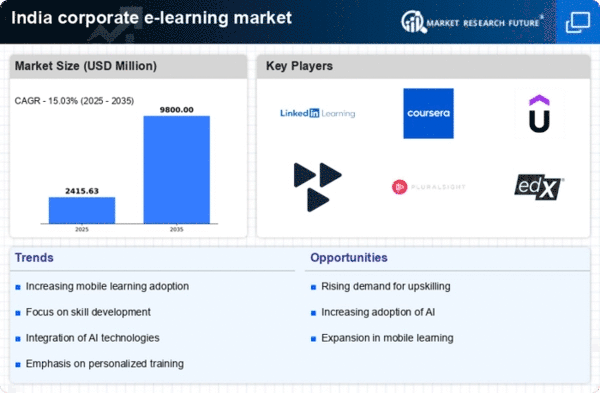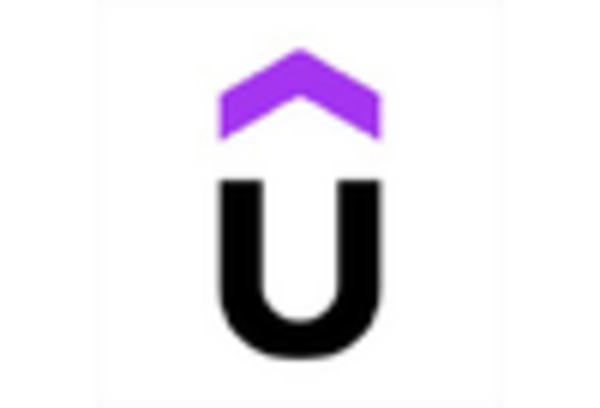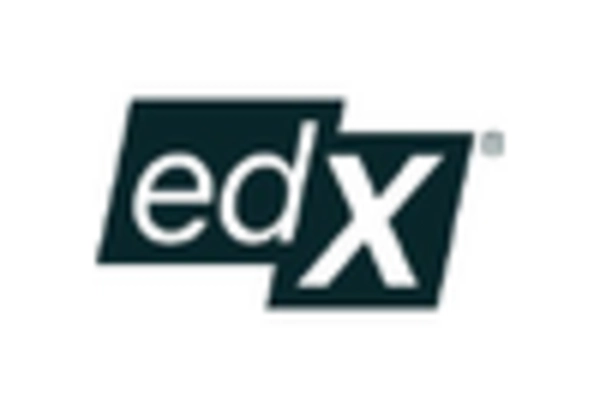Shift Towards Remote Work
The The corporate e-learning market in India is experiencing a transformative shift towards remote work arrangements. As organizations adapt to flexible work environments, the demand for online training solutions has surged. Recent statistics indicate that over 60% of Indian firms have adopted remote work policies, necessitating the development of effective e-learning platforms. This shift has prompted companies to invest in digital learning tools that facilitate seamless training experiences for remote employees. Consequently, the corporate e-learning market is likely to see increased investments in technology that supports virtual classrooms, interactive content, and collaborative learning environments. This trend not only enhances accessibility to training resources but also allows organizations to reach a broader audience, thereby driving growth within the corporate e-learning market.
Growing Demand for Upskilling
The corporate e-learning market in India is experiencing a notable surge in demand for upskilling initiatives. Organizations are increasingly recognizing the necessity of enhancing employee skills to remain competitive in a rapidly evolving business landscape. According to recent data, approximately 70% of Indian companies have reported a heightened focus on employee training programs. This trend is driven by the need to adapt to technological advancements and changing market dynamics. As a result, the corporate e-learning market is likely to expand significantly, with companies investing in tailored training solutions to address specific skill gaps. This growing emphasis on upskilling not only enhances workforce productivity but also contributes to employee retention, thereby fostering a more engaged and capable workforce within the corporate e-learning market.
Integration of Gamification Techniques
The corporate e-learning market in India is increasingly incorporating gamification techniques to enhance learner engagement and motivation. By integrating game-like elements into training programs, organizations can create a more interactive and enjoyable learning experience. Research indicates that gamified learning can lead to a 50% increase in employee engagement levels. This trend is particularly relevant in the context of younger employees who are more accustomed to digital interactions. As companies seek to improve training outcomes, the adoption of gamification strategies is likely to grow, driving innovation within the corporate e-learning market. By making learning more enjoyable, organizations can improve knowledge retention and application, ultimately contributing to a more skilled workforce.
Rising Investment in Learning Technologies
The corporate e-learning market in India is witnessing a significant rise in investment in learning technologies. Organizations are increasingly allocating budgets towards advanced e-learning platforms, Learning Management Systems (LMS), and content development tools. Recent reports indicate that the market for e-learning technologies in India is projected to reach $3 billion by 2025. This influx of investment is driven by the need for scalable and efficient training solutions that can accommodate a diverse workforce. As companies recognize the importance of leveraging technology to enhance training delivery, the corporate e-learning market is likely to experience robust growth. This trend not only facilitates the creation of high-quality training content but also enables organizations to track and measure training effectiveness more effectively.
Emphasis on Personalized Learning Experiences
The corporate e-learning market in India increasingly focuses on personalized learning experiences tailored to individual employee needs. Organizations are recognizing that a one-size-fits-all approach to training is often ineffective. Data suggests that personalized learning can improve engagement and retention rates by up to 30%. As a result, companies are investing in adaptive learning technologies that analyze employee performance and preferences to deliver customized training content. This trend is likely to enhance the overall effectiveness of training programs, leading to better skill acquisition and application. By prioritizing personalized learning experiences, organizations can foster a culture of continuous improvement and innovation, thereby strengthening their position within the corporate e-learning market.
















